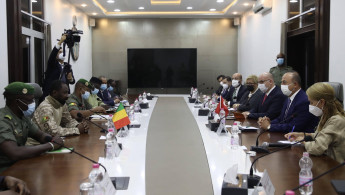Turkey eyes fresh opportunities in post-coup Mali
Despite France showing no sign of drawing down its presence in Mali, Turkey has indicated increased interest in the West African state's future.
2 min read
Turkey's foreign minister met with Mali's military leadership last week [Getty]
Mali's recent military coup has seemingly opened an opportunity for Turkey to make inroads in the West African state - a Muslim-majority country of around 19 million people.
The ouster of former president Ibrahim Boubacar Keita in August was met with condemnation across the board from Western states, the European Union, the United States, the UN Security Council and the Economic Community of West African States (ECOWAS).
Turkey, meanwhile, opted for a more measured response, expressing "deep concern" and urged the country's new military leaders to release the detained former president and government officials.
Importantly, Turkish Foreign Minister Mevlut Cavusoglu became one of the first foreign dignitaries to visit Mali following the putsch, during a tour of Mali, Guinea Bissau and Senegal that kicked off on September 9.
In Mali's capital, Bamako, Cavusoglu met with junta leader Colonel Assimi Goita and other members of the country's ruling Committee for the Salvation of the People.
The top Turkish diplomat said he had “discussed the transition process” with the junta.
“Our desire is for Mali to complete the transition process smoothly. And it is important for the future of Mali to take the necessary steps for democratic elections by establishing a constitutional order as soon as possible," Cavusoglu said. "We sincerely shared our views on this matter like a brother. Under the current conditions of Mali, we find it positive that comprehensive negotiations with civil society and political parties have begun,” he added.
Back in Turkey, pro-government media outlets highlighted grassroots support for the Mali coup and slammed ECOWAS for its punitive action against Mali, which included shutting borders and suspending trade ties.
Significantly, Ankara's response to Mali's coup has contrasted that of France, which has been closely involved in Bamako's affairs since 2012.
After the country's 2012 coup that ousted president Amadou Toumani Toure, France was the first country to establish links with the country's new administration. Since then, France has invested significant military resources in Mali geared towards battling Islamist insurgents in the country's north.
This time, Paris has responded more cautiously, condemning the coup but also holding a meeting with the junta, in a sign that the European state is keen to maintain its presence in Mali.
However, recent friction between Ankara and Paris over the Eastern Mediterranean has shown that President Recep Tayyip Erdogan's is not averse to ruffling feathers with its foreign policy.
The prospect of deeper trade ties with mineral-Rich Mali could also be fuelling Turkey's increased interest in the country and its post-coup future.
Follow us on Facebook, Twitter and Instagram to stay connected





 Follow the Middle East's top stories in English at The New Arab on Google News
Follow the Middle East's top stories in English at The New Arab on Google News
![The UAE is widely suspected of arming the RSF militia [Getty]](/sites/default/files/styles/image_330x185/public/2024-11/GettyImages-472529908.jpg?h=69f2b9d0&itok=Yauw3YTG)
![Netanyahu furiously denounced the ICC [Getty]](/sites/default/files/styles/image_330x185/public/2024-11/GettyImages-2169352575.jpg?h=199d8c1f&itok=-vRiruf5)
![Both Hamas and the Palestinian Authority welcomed the ICC arrest warrants [Getty]](/sites/default/files/styles/image_330x185/public/2024-11/GettyImages-2178351173.jpg?h=199d8c1f&itok=TV858iVg)